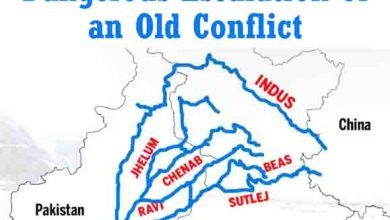Don’t Use Water as a Weapon Against Pakistan – Chinese Scholar Warns India of Serious Consequences
Senior Chinese scholar Victor Gao has warned India: Don’t use water as a weapon against Pakistan. China won’t remain silent if New Delhi violates water treaties.
Don’t use water as a weapon against Pakistan—this was the emphatic warning issued by Victor Gao, a prominent Chinese scholar, in a recent television appearance. His comments come amid growing concerns over New Delhi’s alleged intentions to manipulate the flow of water to Pakistan under the Indus Waters Treaty. Gao’s remarks highlight the escalating water geopolitics in South Asia and reflect China’s firm commitment to defending Pakistan’s strategic interests.
China Issues Strong Warning to India
Appearing on a leading Indian TV channel, Victor Gao, vice president of the Center for China and Globalization, minced no words.
“Any attempt to block Pakistan’s water will be viewed as an attack on the integrity of a close ally,” Gao warned. “India, located in the middle course of the rivers, must understand the consequences. If it overreaches, it should remember that China is upstream.”
This unusually strong language from a Chinese intellectual reflects Beijing’s growing concern over India’s potential to destabilize the region by altering natural water flows.
Victor Gao’s Statement: A Diplomatic Bombshell
Gao emphasized that China and Pakistan enjoy an ‘ironclad’ friendship, implying that Beijing would not remain a neutral observer if India chose to weaponize water.
“Do not do unto others what you would not have them do unto you,” Gao reminded Indian policymakers, invoking Confucian ethics in the context of regional diplomacy.
He further stressed that violating the Indus Waters Treaty would be not just a bilateral breach but a violation of international law, thereby triggering serious diplomatic consequences.
The Indus Waters Treaty and International Law
The Indus Waters Treaty (IWT), brokered by the World Bank in 1960, is one of the most successful water-sharing agreements in the world. It governs the distribution of the Indus River and its tributaries between India and Pakistan.
India has occasionally threatened to revise or revoke this treaty, especially after cross-border tensions. However, any such move would:
- Erode India’s credibility on the global stage
- Violate a decades-old international treaty
- Risk provoking direct responses from both Pakistan and China
World Bank: Indus Waters Treaty Summary
The Brahmaputra Card: China’s Possible Retaliation
Defense experts believe that if India restricts water flow to Pakistan, China could retaliate by leveraging its upstream position over the Brahmaputra River, which flows from Tibet into India’s northeast.
“The water equation in Asia is interconnected,” says Dr. Ayesha Siddiqui, a hydropolitics expert. “If India disturbs one node, the ripple effects could backfire.”
China already has several dam projects on the Brahmaputra, and while it has thus far coordinated water-sharing data with India, a shift in stance could be devastating for downstream Indian states.
Regional Implications and Water Security
The Himalayas are Asia’s water tower, feeding rivers that serve billions across South Asia. With climate change accelerating glacial melt and erratic monsoon cycles, tensions over water resources are expected to increase.
India and Pakistan, both nuclear-armed nations, cannot afford to weaponize such a critical resource. The consequences would be catastrophic—humanitarian, environmental, and geopolitical.
“Water should be a bridge, not a battleground,” said UN Secretary-General António Guterres during a past visit to South Asia.
Strategic China-Pakistan Ties: The “Iron Brotherhood”
Victor Gao’s remarks underline how deeply invested China is in Pakistan’s stability. The China-Pakistan Economic Corridor (CPEC), part of Beijing’s Belt and Road Initiative, has strengthened this alliance.
With billions of dollars in infrastructure investments, China has strategic stakes in ensuring that Pakistan’s water security and sovereignty remain intact.
“We will not compromise on Pakistan’s core interests,” Gao declared.
This is not just rhetoric. Chinese diplomacy has historically backed Pakistan on issues ranging from Kashmir to global forums like the UN Security Council.
India’s Calculated Risks: Domestic Politics or International Gamble?
Some analysts believe India’s water threats are more symbolic than substantive, aimed at domestic audiences during elections or after terror incidents. However, even rhetorical threats can strain international ties and destabilize the region.
“India’s water aggression could backfire by pushing Pakistan and China closer together,” warned Dr. Salman Bashir, former foreign secretary of Pakistan.
With a general election cycle looming in India, experts are watching closely whether New Delhi escalates rhetoric or takes actual steps.
Expert Analysis: What Comes Next?
If India continues down the path of threatening Pakistan’s water supply, experts suggest the following scenarios could unfold:
- Diplomatic isolation for India at international water forums.
- Formal Chinese protests or actions through UN channels.
- Bilateral or trilateral escalations, involving military posturing.
- Joint China-Pakistan initiatives to internationalize the issue.
- Climate NGOs and watchdogs taking India to international courts.
India must weigh short-term political gains against long-term regional stability.
Conclusion
In light of Chinese scholar Victor Gao’s firm warning, the message is loud and clear: Don’t use water as a weapon against Pakistan. The stakes are too high, and the regional balance too fragile, for any nation to tamper with transboundary water flows.
Water is not just a natural resource—it is a matter of human survival and regional peace. India, Pakistan, and China must engage in cooperative hydrodiplomacy, not zero-sum rivalries.
Internal Links:
External Links:







